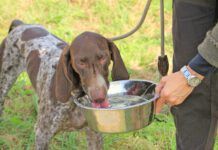Coccidia are common intestinal parasites that impact dogs, particularly puppies and immunocompromised animals. While this may sound alarming, coccidiosis in dogs, the disease caused by the coccidia parasite, is treatable and preventable with proper hygiene and prompt veterinary care.
What Are Coccidia in Dogs?
Coccidia are microscopic, single-celled organisms known as protozoa. They infect the intestinal lining of dogs and reproduce within the cells of the intestinal tract. Unlike some parasites, coccidia cannot be seen with the naked eye and require microscopic examination of a fecal sample for proper diagnosis.
How Did My Dog Get Coccidia?
Dogs, especially puppies, typically become infected with coccidia by ingesting oocysts, the parasite’s hardy eggs, which are shed in the feces of an infected animal. These oocytes can survive in the environment for extended periods of time, particularly in warm, moist conditions like kennels, dog parks, or the soil in yards.
A dog may ingest the oocytes by licking contaminated surfaces, eating contaminated food or soil, or having contact with infected feces. Once ingested, the oocysts go under changes that allow the organism to invade the cells of the dog’s intestinal lining, leading to inflammation and gastrointestinal upset.
Coccidiosis is most common in puppies under 6 months of age because their immune systems are still developing and are less able to fight off infection. Stress, such as weaning or relocation, can further weaken a puppy’s immune system and make them even more vulnerable to infection.
Adult dogs can also become infected, although they may not show signs of infection and can act as asymptomatic carriers, shedding and spreading the parasite to more vulnerable animals.
What Does Coccidia Cause in Dogs?
The symptoms of coccidiosis can vary based upon the dog’s age, immune status, and the severity of infection. In mild cases, there may be no visible symptoms. More commonly, infected dogs may experience:
- Watery or diarrhea, with mucous and/or blood
- Dehydration
- Vomiting
- Weight loss
- Lethargy
- Pot-bellied appearance
Left untreated, especially in puppies or dogs with underlying health issues, coccidiosis can lead to severe dehydration which can be life-threatening if left untreated.
Diagnosis is made by a veterinarian through a fecal flotation test, where the stool sample is examined under a microscope for the presence of oocysts.
Treatment for Coccidia in Dogs
Treatment involves prescription antiparasitic medications that help stop the parasite from reproducing. Treatment may last five to 14 days, depending on the severity of infection. In severe cases, supportive care such as fluids, electrolytes, and a diet for sensitive stomachs may be needed to help stabilize the dog.
If your dog tests positive for coccidia, sanitation is key. Avoid visiting high-traffic areas, like dog parks and kennels, with puppies or young dogs. Remove any feces from your yard and bag it for disposal. Wash toys and bedding and keep the areas your dog frequents sanitized. While there is no vaccine for coccidia, good sanitation, stress reduction, and early intervention can go a long way in controlling its spread.
Preventing Coccidia Infections in Dogs
Coccidia spreads easily though contaminated feces and the environment, but with early detection and appropriate treatment, most dogs recover quickly. Responsible pet care, including routine vet visits, fecal screenings, and maintaining sanitary conditions can help prevent infection and keep your dog happy and healthy.






